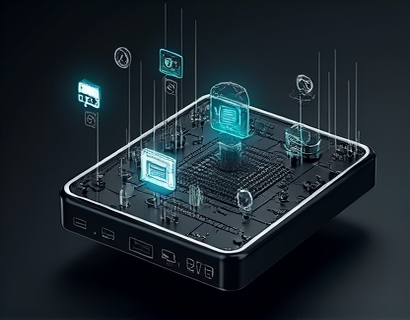AI-Driven Personalized Healthcare: A New Era of Instant Expert Insights and Reliable Information
In the rapidly evolving landscape of healthcare, the integration of artificial intelligence (AI) is revolutionizing the way individuals access and receive medical advice. This shift towards AI-driven personalized healthcare offers unprecedented opportunities for health enthusiasts and individuals seeking tailored medical insights. By leveraging advanced technology, these platforms provide instant expert advice and reliable information, transforming the traditional healthcare experience. This article delves into the transformative power of AI in healthcare, focusing on how these innovations can empower users to make informed decisions and enhance their overall well-being.
The Rise of AI in Healthcare
The healthcare industry has long been recognized for its complexity and the critical need for personalized care. Traditional methods often involve lengthy consultations and delayed responses, which can be insufficient for timely decision-making. The advent of AI has addressed these challenges by introducing instant, personalized medical insights. AI algorithms can process vast amounts of data quickly, providing users with relevant and accurate information in real-time. This capability is particularly valuable in a world where health information is abundant but often overwhelming.
Personalized Medical Insights at Your Fingertips
One of the most significant advantages of AI-driven healthcare platforms is their ability to offer personalized medical insights. These platforms use machine learning algorithms to analyze user data, including medical history, lifestyle, and current symptoms. By doing so, they can provide tailored recommendations and insights that are specific to each individual. For instance, a user with a history of hypertension can receive customized advice on diet, exercise, and medication management, all based on the latest medical research and their personal health profile.
Expert Advice Without the Wait
Traditional healthcare models often involve waiting for appointments and delayed responses to medical queries. AI-driven platforms change this paradigm by offering instant expert advice. Users can access a wealth of knowledge and guidance without the need for scheduling appointments or waiting for responses from healthcare professionals. This immediacy is crucial in situations where timely information can significantly impact health outcomes. Whether it's understanding symptoms, exploring treatment options, or seeking preventive measures, AI can provide quick and reliable answers.
Enhancing User Engagement and Education
AI-driven healthcare platforms are not just about providing information; they are designed to engage users and enhance their understanding of their health. Interactive tools, such as symptom checkers and health trackers, empower users to take an active role in their healthcare. These tools can help users monitor their health metrics, set goals, and receive feedback based on their progress. By fostering a deeper understanding of health concepts and personal data, these platforms encourage users to make informed decisions and adopt healthier lifestyles.
Building Trust Through Reliable Information
Trust is a fundamental component of any healthcare solution. AI-driven platforms prioritize the accuracy and reliability of the information they provide. This is achieved through rigorous data validation, continuous learning from medical databases, and collaboration with healthcare experts. Users can confidently rely on the insights and advice offered by these platforms, knowing that they are based on the latest medical research and best practices. This trust is essential for users to feel secure in their health decisions and to fully benefit from the personalized guidance provided.
Integration with Wearable Technology
The synergy between AI-driven healthcare platforms and wearable technology is a game-changer in personalized healthcare. Wearable devices, such as smartwatches and fitness trackers, continuously monitor various health metrics, including heart rate, sleep patterns, and physical activity. When integrated with AI platforms, this data can be used to provide more comprehensive and context-aware insights. For example, an AI system can analyze heart rate data to detect potential arrhythmias or use sleep patterns to suggest improvements in sleep hygiene. This integration creates a holistic view of an individual's health, enabling more accurate and actionable recommendations.
Addressing Mental Health with AI
Mental health is a critical aspect of overall well-being, and AI-driven healthcare platforms are increasingly focusing on this area. These platforms can offer personalized mental health support through chatbots and cognitive behavioral therapy (CBT) tools. Users can engage in conversations with AI-powered chatbots to discuss their feelings, receive coping strategies, and track their mental health progress. This accessible and non-judgmental support can be particularly beneficial for individuals who may hesitate to seek traditional mental health services. By providing immediate and confidential support, AI can help bridge the gap in mental health care.
Chronic Disease Management
For individuals managing chronic conditions, AI-driven healthcare platforms offer significant benefits. These platforms can provide continuous monitoring, real-time alerts, and personalized management plans. For example, a user with diabetes can receive tailored advice on blood sugar levels, meal planning, and exercise routines. The platform can also integrate with medical devices to track glucose levels and adjust insulin dosages based on real-time data. This level of personalized support can improve disease management, reduce hospital visits, and enhance the quality of life for chronic disease patients.
Preventive Healthcare and Early Detection
One of the most powerful aspects of AI in healthcare is its ability to focus on prevention and early detection. By analyzing user data and identifying risk factors, AI platforms can provide proactive recommendations to prevent health issues before they arise. For instance, a user with a family history of heart disease can receive personalized advice on lifestyle changes and regular screenings to monitor their risk. Early detection of potential health problems can lead to more effective treatments and better outcomes, ultimately reducing healthcare costs and improving patient well-being.
Challenges and Considerations
While AI-driven personalized healthcare offers numerous benefits, it is essential to acknowledge the challenges and considerations involved. Data privacy and security are paramount, as sensitive health information must be protected. Platforms must adhere to strict data protection regulations and implement robust security measures to ensure user data is safe. Additionally, the accuracy and reliability of AI algorithms depend on the quality and quantity of data used for training. Continuous validation and updates are necessary to maintain the highest standards of care.
The Future of Personalized Healthcare
The future of personalized healthcare is bright, with AI poised to play an increasingly central role. As technology advances, we can expect even more sophisticated and intuitive platforms that seamlessly integrate with various aspects of daily life. The combination of AI, wearable technology, and electronic health records will create a comprehensive ecosystem for personalized healthcare. Users will benefit from more accurate predictions, personalized treatment plans, and continuous health monitoring. The goal is to create a healthcare system that is proactive, preventive, and deeply tailored to each individual's needs.
Conclusion
AI-driven personalized healthcare represents a transformative shift in how we approach health and wellness. By providing instant expert insights and reliable information, these platforms empower individuals to take control of their health in ways previously unimaginable. The integration of AI with wearable technology and electronic health records further enhances the capabilities of these platforms, offering a holistic and proactive approach to healthcare. As the technology continues to evolve, the potential for improved health outcomes and enhanced well-being is immense. Embracing AI-driven personalized healthcare is not just a choice; it is a step towards a healthier, more informed future.










































